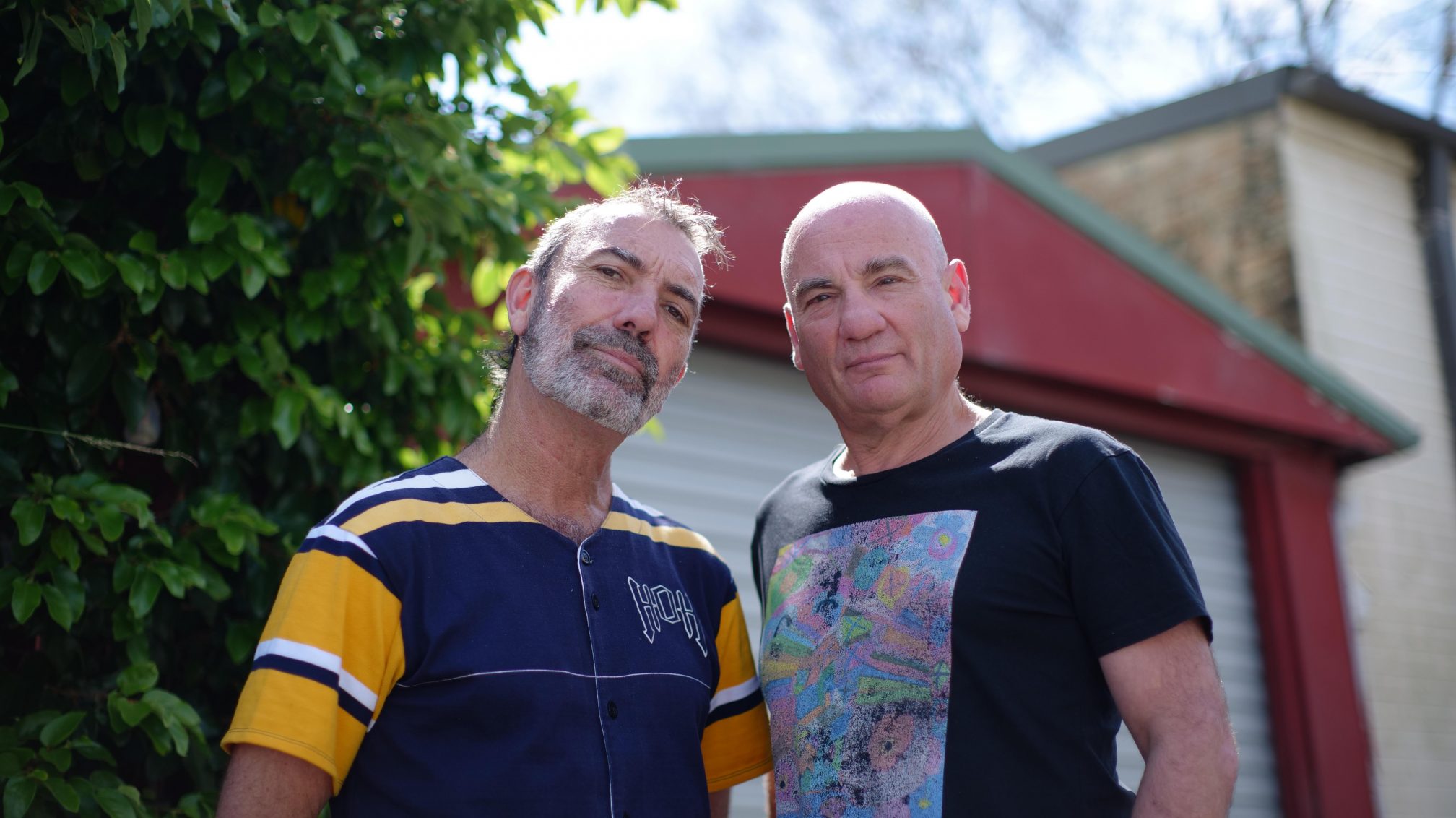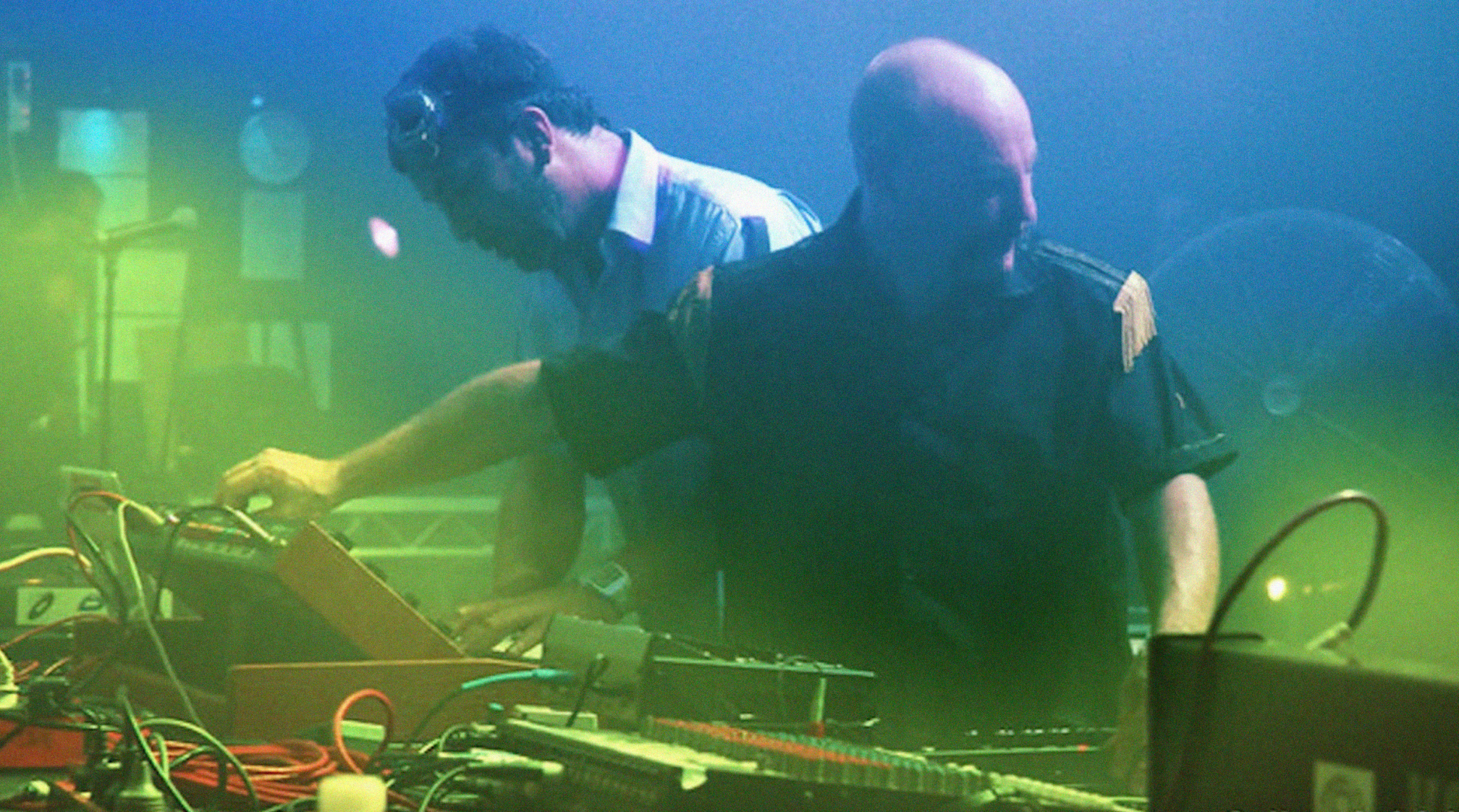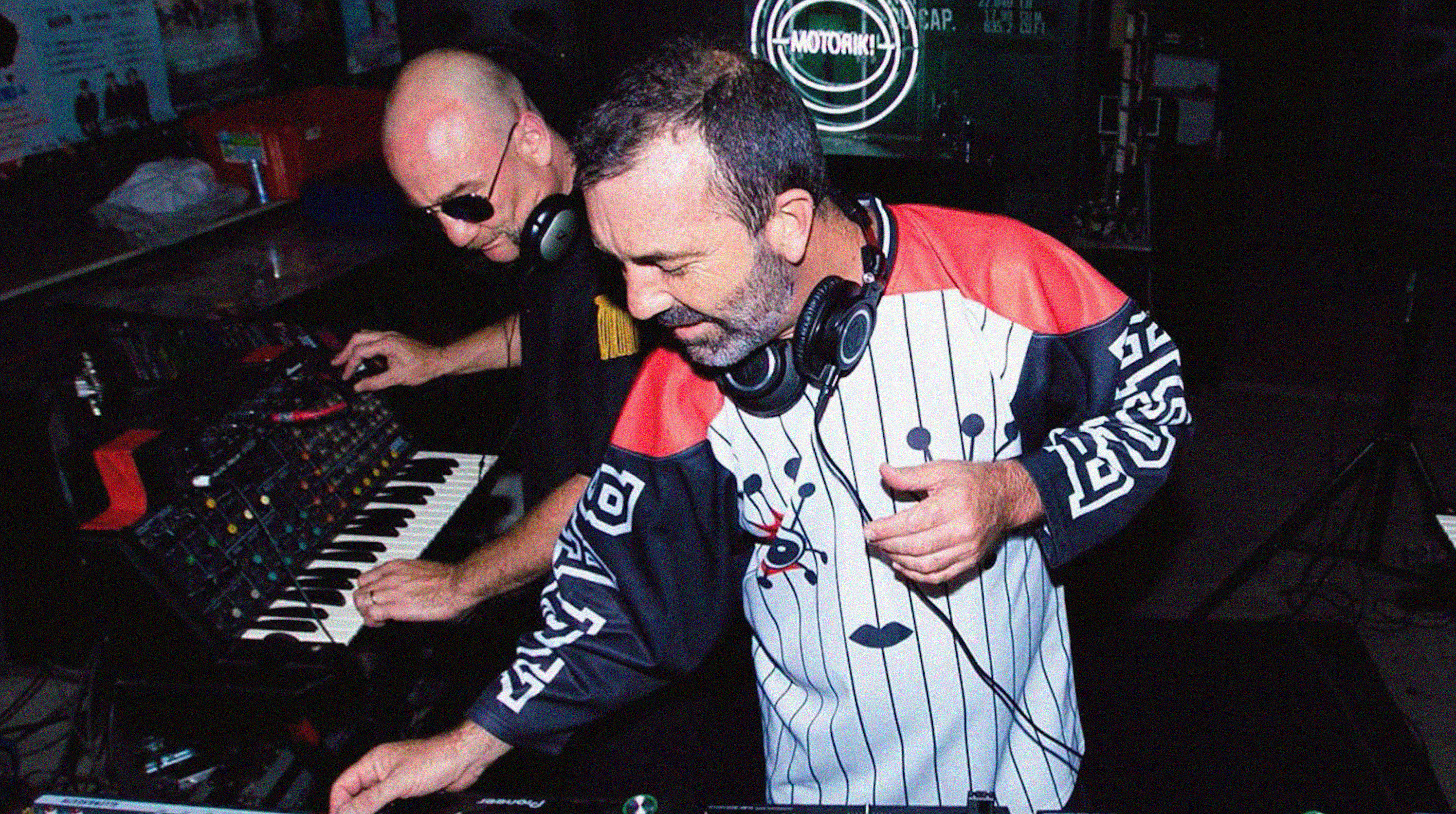 INTERVIEWS
INTERVIEWS
30 years of 'Sweetness & Light': An Itch-E & Scratch-E story
As one of Australia's most influential dance acts celebrates the 30th birthday of their first album, Paul Mac and Andy Rantzen reflect on how the decades since have left them viewing their work.
Itch-E & Scratch-E, also known as the combined collaborative project of Paul Mac and Andy Rantzen respectively, are two of Australian dance’s most legendary figures.
The duo, who have both gone on to have long, successful careers both in their own musical, educational and professional endeavours, were there together right at the birth of Australia’s warehouse, doof and rave culture.
While their first EP, ‘Irritable’, released in 1992, their 1993 album ‘Itch-E Kitch-E Koo’ stands as one of Australian dance’s most influential projects, with the record’s stand out single ‘Sweetness & Light’ taking home the 1995 ARIA for Best Dance Release.
"We'd like to thank all of Sydney's ecstasy dealers, without whom this award would not be possible,” Paul famously declared on live television.
2024 sees the 30-year anniversary of ‘Itch-E Kitch-E Koo’, and a celebratory re-release of the album not only via streaming platforms, but on vinyl for the first ever time in a commemorative and limited edition form. Distributed by Here to Hell, a collaborative label by The Presets' Kim Moyes and Revolver resident DJ Mike Callander, the re-release promises not only a far more clear and punchy listening experience, but a variety of reworked versions of previous tracks ready for modern dance floors.
To celebrate the release’s anniversary, Mixmag ANZ sat down with Itch-E & Scratch-E themselves.
Q: How do you both feel about the cultural importance of this record, 30 years on?
PAUL: I'd rather think of it in those terms. Revisiting it was an eye opener, because I hadn't heard it for a whole bunch of years, and it was more digitally releasing it, or re-releasing it, and I was keen to just have it available, if nothing else.
I teach technology and pop music at the Conservatorium, and I just want it on streaming platforms and stuff so I can actually share it with people and it exists. It is up there on YouTube and stuff, but I just wanted it to be, you know, a legit release.
Actually listening back to it, I was kind of, I was more blinded by the state of mind that we were in at the time, which was just a really nice reminder of, you know, doing a first album. You have no expectations whatsoever. You just make this thing that you hope is beautiful. So, revisiting it was quite an eye opener. I can hear Andy's influence, I can hear my influence, and it was just a beautiful thing to revisit.
ANDY: I don't ever ask myself, what's the cultural impact of what we do, or anything like that. It doesn't actually appear on my radar, and I'm happy for it to have no cultural impact at all.
I really like the process of writing music, and the impact is, for me, is there in the small group dynamic, and the windows that it opens up not only between the speakers, but within ourselves.
The self discovery aspect of it is a big deal for me.
I do like the music to come out, don't get me wrong, but it feels very much like casting your bread upon the waters at that point. Putting a message in a bottle. You really hope someone will find it, but you don't really know. It's the romance of doing that that you enjoy, hoping someone will find it, and you don't care when or how, but you want to enjoy the random gift aspect of it.
-
Q: Perhaps then I'd like to delve more into this self-reflection clearly coming about as a result of the re-release. How are you able to see this record differently to how you were viewing it when you were making it?
ANDY: Well, it's like looking at a different person, isn't it? It's almost as if a different person made it. Wouldn't you agree, Paul?
PAUL: Andy came up with the quote once, which I will never forget, which is “as you get older, you just become a more full on version of yourself.”
When I look back at this, it is like the seeds of who I became. It's kind of fun when you can examine what was Andy's idea, and then “I did that”, and then we talked about this, and then that happened, and then Andy played me that CD, and then I heard that, and you can just feel the parts falling into place. You can feel the conversation, the honest conversation, the musical conversation, that happened at the time.

Q: With the record being released again, you're breathing a whole new life into it. Do you think the dancers of today will dance to it differently to the way they did in ‘94?
PAUL: I went to the last Flume concert in Homebush, because I wanted to see how the kids were dancing to that sort of “difficult” music…
…and I had the worst gig ever. I was like, at the mixing desk, and it was just phones in the air, and nobody was dancing. I was like, “this is awful I'm going to go.”
But then, at the back, the kids were going ballistic with this other form of dancing that I hadn't even seen. If only I was up the back for the whole concert, that would have been so much better.
I don’t care, frankly, how it’s received. I’ve got no value judgement about whether it was better back in the day versus now, I just want this music to be in the conversation.
ANDY: I recently went to a club to check out what people were doing, and I was struck by just how similar the vibe was to back in the day. Everything felt very comfortable and familiar to me.
Obviously everyone was a lot younger, and I might have as well been someone’s dad, but the vibe was very familiar. If anything I think it’s become a lot more professional in terms of sound systems that are being used, the DJs are consistently more skilled, and there’s a lot more women behind the decks.
But in every other way, it feels like familiar territory.
With that said, I was amazed by how quickly and efficiently the place closed up. Once it hit midnight or 1AM, everyone was gone and the gear was out of there in less than an hour. I was amazed, it was like a well oiled machine.
In the day, you would have seen people just stumbling around for hours.
-
Q: What were some of your favourite places to go out when you were playing?
ANDY: Club 77 was kind of our spiritual home, perhaps you could say. It was very open minded and the crowd was very diverse, and they were up for anything. There was a lot of Australian music being played, often on CDRs that had been brought in on the night and just handed over to the DJ.
This is where musical movements and electronic music happen all over the world. This is how it works. It's kind of a synergy between the DJs and the producers and the crowd.
We did do the odd rave, and we lived in parallel to that warehouse world. We often felt like we didn't quite connect.
It was slightly different to what we were doing, and perhaps our sound was a bit more club oriented than flat out, you know, open air or warehouse rave.
PAUL: I agree we were kind of parallel to it, not in the thick of it. I mean, we played at Happy Valley, which was wild, and there's video footage of that, which is hilarious.
The cool thing was that we used to use it as an experiment to write more music. So, you know, somebody would book us for a small rave in a warehouse in Petersham, and Andy would be like, “well, let's write a new set”, and we would.
I think that that's also part of that dividing line that we were straddling, because we were kind of “live”. We were a band which meant everybody looked at the stage, which is kind of where mega parties are at now, whereas in Club 77 DJs should be heard and not seen, which is how I prefer it.
That, to me, was the lesson of house music. We dance with each other, which is why it works so well in queer culture. Whereas in concert culture, it's a completely different thing.
It's like, “let's all look at the video screens”, or wait for the massive moments.
-
Q: “Live” aside, you guys won the ARIA for the dance track of the year for ‘Sweetness & Light’. I’d love to know, do you think you would win the ARIA in 2024?
ANDY: No.
PAUL: It was just the right vibe at the right time. Despite the fact that it's abstract instrumental techno, it has a verse and a chorus and a second verse and a second chorus.
It works on radio, it has a pop structure. It was awful to try and DJ. It had nowhere to mix in, nowhere to mix out. It faded out. It wasn't sort of consciously trying to be a dance classic or anything, it just happened to be a track that was initially nicknamed “girly disco” on our floppy drive.

Q: Are there any tracks off the record that you’ve now fallen in love with in an entirely new way?
PAUL: It's always been ‘Awaken’ for me. That first track, track one, it's a 10 minute odyssey, and it came about like that.
We did an EP before this one, and we were writing tracks with form, a starter middle, and end bits. The final track of that last EP was a jam. In those days, you had the machine set up and four hands turning knobs, muting kick drums, sending things to reverb, blah blah blah.
It was just a really long jam. We took it to Robert Racic, who was an amazing producer and DJ, and Robert was like “yeah this is cool. What if we hacked into it and made a track out of this jam?”
So then we started, and we’d found a whole new way of working where you didn’t necessarily think about a complete track, you just improvised and did a live recorded performance.
‘Awaken’ was originally about 22 minutes long.
It was literally me and Andy just vibing on each other’s performance of this music, with six or seven layers to play with on different machines, and off you go.
That editing process, that track, to this day that’s my favourite. It still blows me away because it’s just hearing different layers coming in, and hearing the spontaneity that was captured in that.
Q: Andy?
ANDY: Well, ‘Awaken’ too.
But, my close runner up would be ‘Interference’, which is just a monster of a track. It has a quality, a texture, a vibe and a feeling that we never even came close to in approaching again. I don’t think we’d be able to even if we tried.
Everything was in its right place, but it just sounds like it’s on the verge of chaos. Which I guess it was.
-
'Itch-E Kitch-E Koo' is available on Bandcamp via H2H, & on all streaming platforms.
Jack Colquhoun is Mixmag ANZ's Managing Editor, find him on Instagram.


